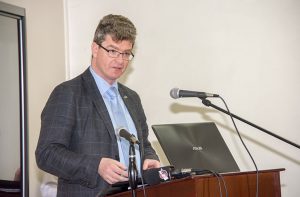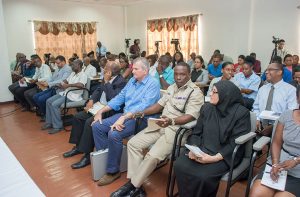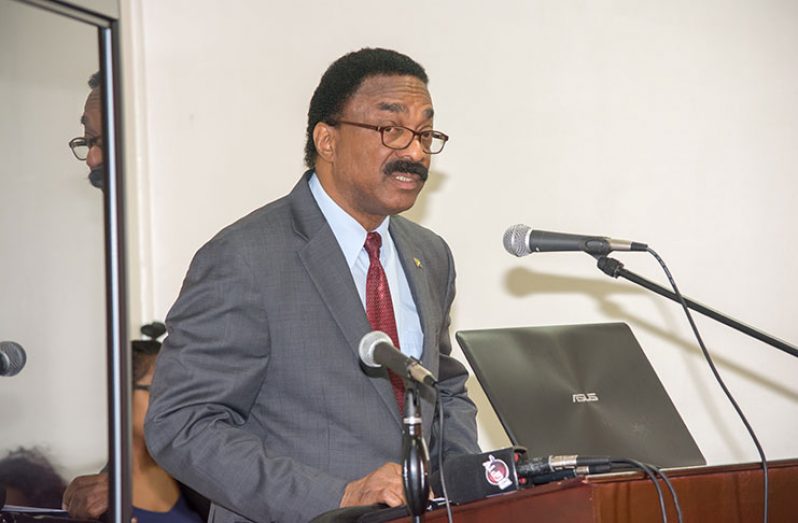— Attorney General tells Anti-Corruption, Anti-Money Laundering Seminar
A STRONG legislative framework is not enough to successfully combat corruption, Attorney General and Legal Affairs Minister Basil Williams said, while underscoring the importance of collaboration in the fight against this scourge. Such collaboration, he said, will lead to effective detection, investigation and analysis of evidence.
The Attorney General was at the time, delivering remarks during the opening ceremony of an Anti-Corruption, Anti-Money Laundering Seminar at the Police Officers’ Training Centre on Wednesday.
Quoting the former Secretary-General of the United Nations (UN), Kofi Annan, the Attorney General said “corruption is an insidious plague that has a wide range of corrosive effects on societies.”

It was further pointed out that illicit activities such as money-laundering, misappropriation of public property, bribery, embezzlement and misuse of public office are all by-products of corruption –- an act which involves the misuse of powers by Government officials for illegitimate private gain.
“They hinder economic growth as a corrupted society deters investors, both local and foreign. Corruption affects the integrity of financial institutions, and undermines public confidence in the financial system as criminals will use these institutions to process their ill-gotten gains,” the Attorney General told those present.
However, it was noted that a strong legislative framework promotes prevention, detection and prosecution, while upholding the ideals of good governance.
LEGISLATIONS
Here in Guyana, the Integrity Commission Act, the Access to Information Act and the Anti-Money Laundering and Countering the Financing of Terrorism Act are strategically in place to guard against acts of corruption, and money-laundering, and for the institutionalisation of punitive measures against those who dare to act in breach of the legislation.
Soon these legislations will be complemented by the State Asset Recovery Act, the Witness Protection Act and the Protected Disclosures (Whistleblower) Act. Currently, these bills are before the National Assembly.
According to the Attorney General, the State Asset Recovery Bill, which is currently before the National Assembly, demonstrates Guyana’s commitment to its international obligations under the UN Convention against Corruption.
However, he emphasised that a strong legislative framework is not sufficient to successfully fight against corruption. As such, the Government has appointed a special prosecutorial team, comprising six competent and experienced Attorneys-at-Law to prosecute high-profile cases, with the hope of successful convictions.

“The appointment of the special prosecutors will enhance the Government’s capacity to secure successful convictions. The prosecutors will be tasked with prosecuting high-profile corruption cases, including recovery of state assets required by public officials or by money-laundering,” Minister Williams explained.
At the time, he was speaking in the presence of the British High Commissioner, Greg Quinn; Financial Investigation Expert, Dr Sam Sittlington; SARU’s CEO, Major (Rtd) Aubrey Heath-Retemyer; International Financial Investigation Advisor, Ian McDonald; FIU Director, Matthew Langevine; and Special Advisor to the Attorney General, Tessa Oudkerk, among other officials.
CANCERS
For the British High Commissioner, corruption and money-laundering are cancers. Both acts, he emphasised, have direct impacts on citizens and undermine the people’s trust in Governments and businesses.
In Guyana, corruption and money-laundering remain a problem, Commissioner Quinn said. He said although the Transparency International Perception Index Score for Guyana in 2016 improved when compared to 2015, the country has a far way to go.
It was explained that from a total of 176 countries assessed for perceptions of corruption in 2016, Guyana came in at 108th position with a score of 34 out of 100 with the average score being 43. In 2015, the country had scored 29.
“Too many people still think that they could get away with corruption and with financial abuse. If Guyana is to continue to grow and use future resources for the betterment of all, It will be necessary to address both of these issues,” the British High Commissioner said. However, he took note of the steps being taken by the Government to stamp out corruption and acts of money-laundering and the financing of terrorists.
In his final remarks, he made it clear that corruption should be exposed, and the corrupted pursued and punished. Additionally, he said those who would have suffered from corruption should be supported.
Dr Sittlington told reporters that the seminar was organised with the primary objective of creating a link between the agencies currently working to combat money-laundering and corruption with the asset recovery unit, noting they all interlink.
He said the seminar is a follow-up from one held last year, and though the process is a slow one, there has been progress. It is believed that once the SARU Bill is passed, greater successes will be achieved.













